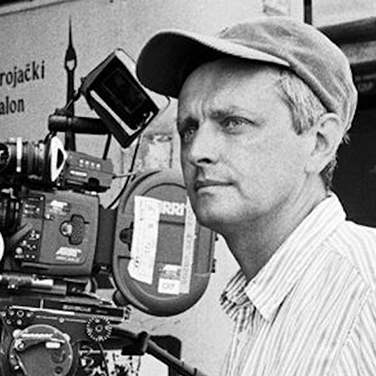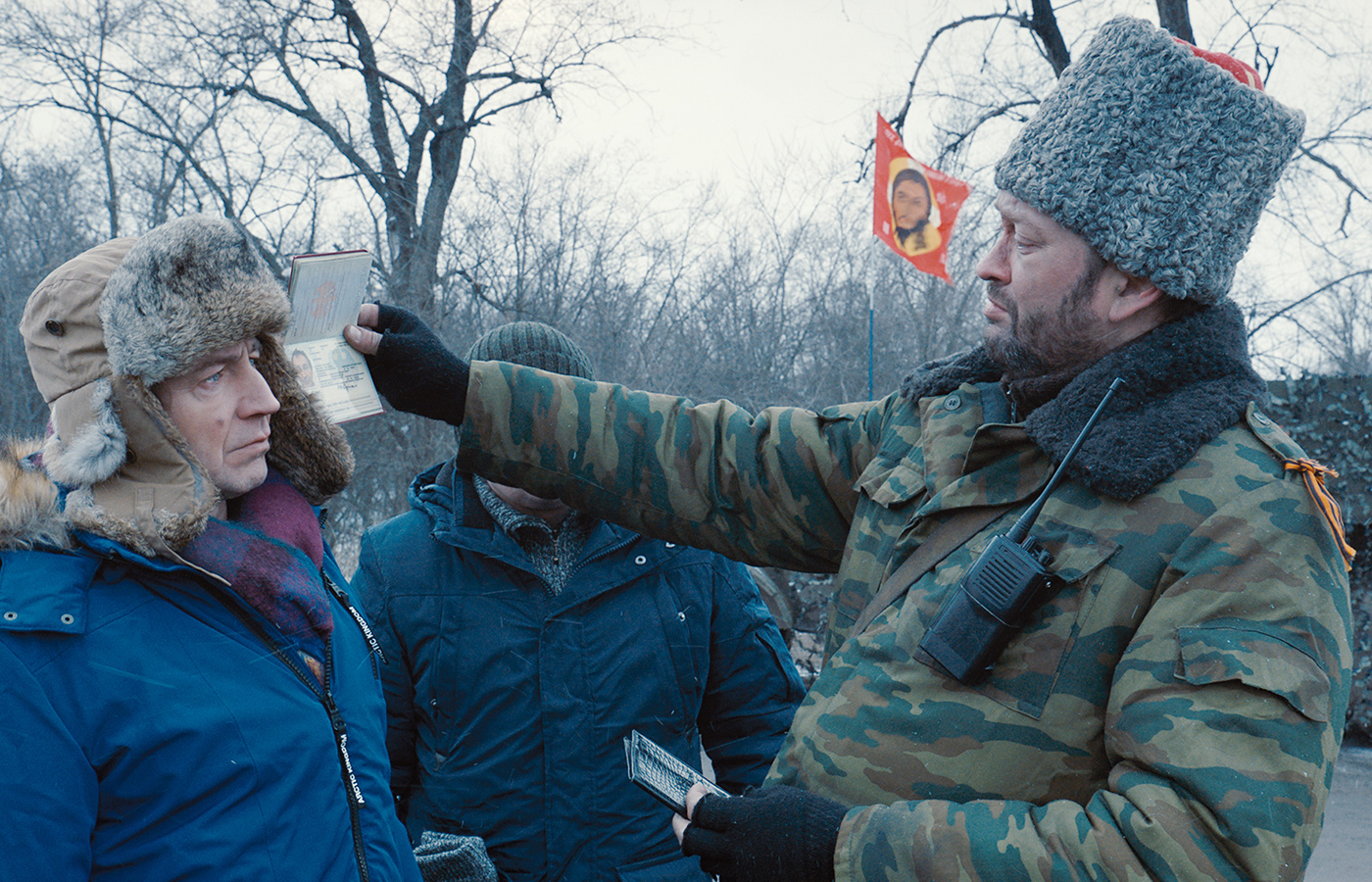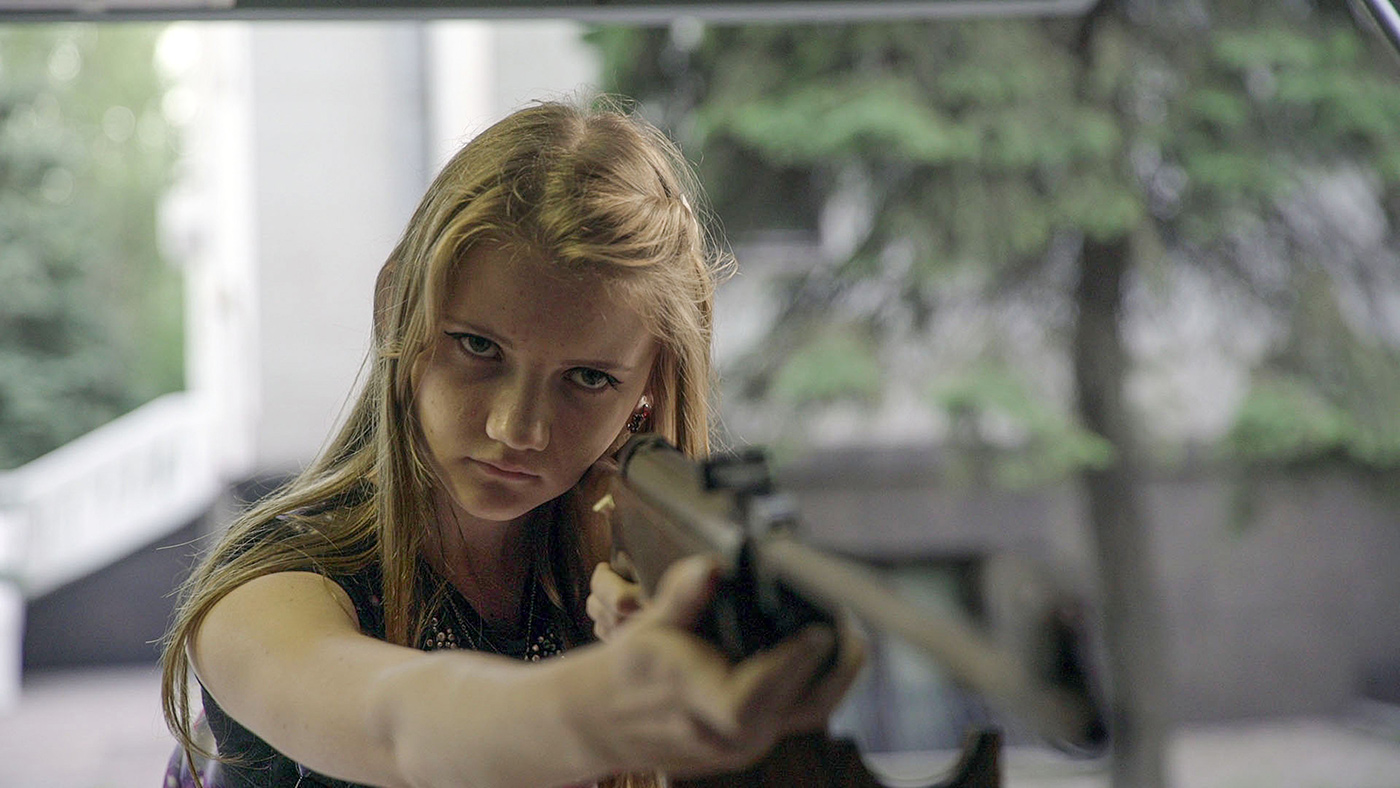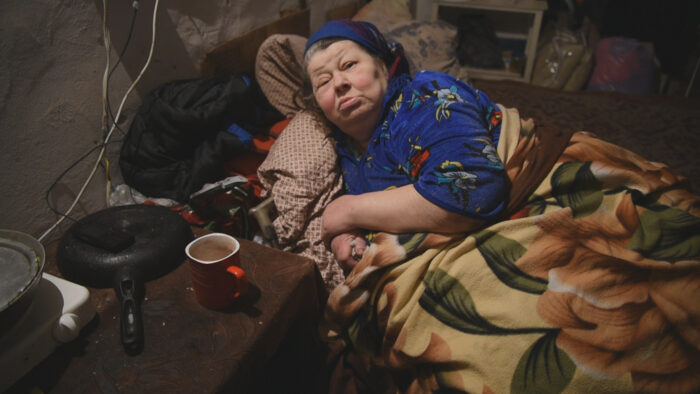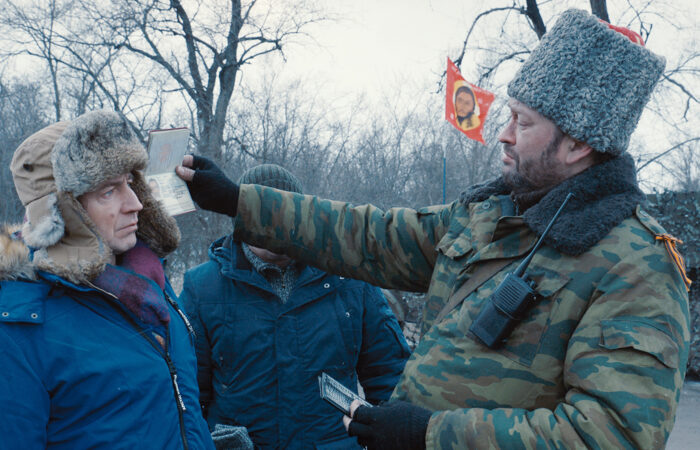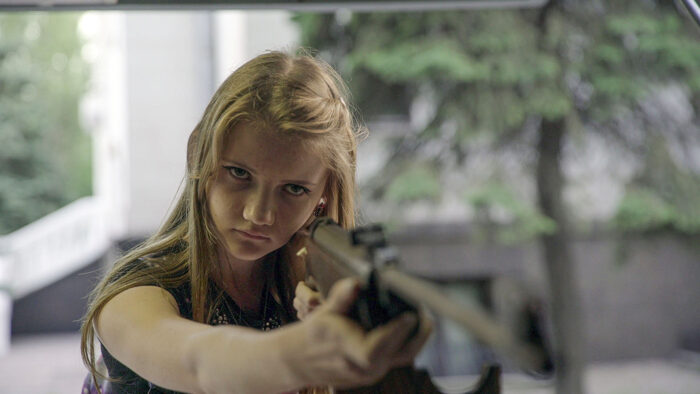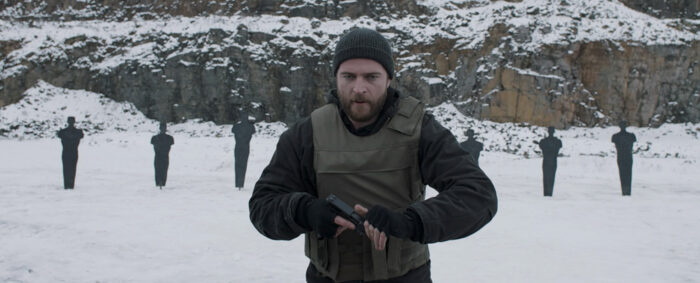You started working on “Donbass” in 2015, at a time few in the west knew about the violence that had broken out there. Why then?
At the time, in my country, this was the main topic. For us, war had started. And it started in a special way, using the power of propaganda, TV cameras and news to create the kind of ‘alternative’ reality that the Russians had trialled in Crimea already. Suddenly those guys in military fatigues show up out of nowhere, paving the way for full invasion. Who were those “little green men”, what were they coming from? Putin himself later acknowledged they were Russian special units. But, officially, back then, they didn’t exist and ‘no one knew’… So I was interested in exposing a pattern – the method used before in Crimea and that was being used again in Donbas to take over and occupy a territory.
“Donbass” has this raw, immersive quality of a deep-dive doc. Why not just make a documentary as you did with your other film about Ukrainian politics, “Maidan”?
In this case my idea was to make the reality we were showing as convincing as possible. You’ve got to realise that a documentary isn’t a neutral document, a one-to-one depiction of reality anyway. As the authors you make many decisions about light, about the camera angle, the structure, etc. The same goes for news – there’s always some degree of ideological framing linked to many factors and a context – it looks like reality, but it isn’t reality. With “Donbass” I wanted to immerse the audience, to shake people into thinking. And I found that, in this case, fiction worked better.
The film is a collection of 13 rather dark, cynically comic vignettes depicting the reality in the separatist zone. Is it really all taken from real-life material you found on YouTube?
Yes, totally, what you see in my film are mostly scenes from amateur videos I found on youtube, sometimes copy-pasted! For example in the public bullying scene [a captured Ukrainian-army loyalist tied up at a lamppost is abused and beaten up by passersby], the dialog is almost one to one what was on the video I found, I only added a beginning and an ending, to make it more compelling. I actually ran an interesting experiment about this during some masterclasses: I’d show the originals I found on Youtube and what we made out of them, and we’d compare – which worked best? Sometimes, I lost, I missed it wasn’t as strong as the original real-life one. But I must say that most of the time my version won (laughs).
Your political allegiance is clear, you’re an outspoken supporter of Zelensky and of a free independent Ukraine – and yet this film doesn’t feel like a political manifesto. Were you at any point concerned with falling for the kind of propaganda you’re exposing in your film?
What I’m doing isn’t about taking sides or telling people what’s right or wrong. Politics isn’t my field. I make films, art, not journalism or manifestos. As a filmmaker, to have an idea means to have a clear artistic vision. In this case, for me, it was evident that ‘grotesque’ was the artistic form I needed to express my idea of what’s happening in the Donbas.
Why “grotesque”?
Grotesque perfectly depicts the reality of the post-soviet world I come from, with the exception of the Baltic states – there things work differently. People play roles, reality is routinely made up. At some point in my film, you see Russian soldiers from Buryatia – or some other parts of big Russia – and they say they’re locals from Donbas. Of course it’s a lie, and why do they lie? Because officially “Russians aren’t there”. It’s an episode I re-enacted from a real-life story that the fixer you see in the film reported to me. He actually plays his own role: when the frontline soldiers realise he’s with a German journalist from FAZ, they get a random local soldier to play commander. The Russian units always had a random idiot there to enact the “local commander” for the press. A puppet!
Your film does feel like a life-size ‘puppet show’, in which every last civilian readily engages in the new script presented to them. Women, older citizens… they all perform a role in the tragedy – all guilty!
Yes, totally. And the way it works is that you need to come up with a narrative that people will buy – something that will stick once propagated through the power of mass media. Do you remember when they decided to close atomic facilities in Germany? The reason was “Fukushima” and it worked, even though I personally don’t think that an earthquake/tsunami all the way in Japan was a ‘good’ reason for Germany, which isn’t an active seismic place. There was no rational logic really, but it worked. So instrumentalizing fear always works. The same happened at the beginning of the pandemic. It’s a complex issue, but the pattern is pretty simple, simplistic even.
Like instrumentalizing the “fascists are back” fear? It’s a main narrative-thread in Russia’s propaganda, and very popular in the Donbass as you show in your film…
Sure I show people repeating this kind of nonsense. But you know, you can repeat foolish nonsense and Putin’s lies, or you can repeat a more rational, more clever narrative…
This begs the question: why do people buy such “foolish nonsense”?
If we were smart, the war would have never happened. War is the stupidest, most pointless human activity, and yet, we keep engaging in them. Of course you’d need to go into the roots of this war. At least back to the collapse of the Soviet Union and how the so-called democratic transitions of all those post-USSR countries were supported with western money, but not with any political reckoning of the failed and criminal system that destroyed lives and souls during all those years. There was no Nurenberg trial. No attempt at holding people accountable – the same communist party and KGB types remained in power. To this day you still have the Komsomolskaya Pravda right here, in Ukraine! So we ended up with recreating similar patterns and similar power structures. No wonder the capitalism we developed is so corrupt – it’s barbarian capitalism, totally amoral – because it grew out of the same deshumanisation we had during Soviet times.
So this barbary you show in your film, it pre-existed the war? It isn’t a consequence of it…?
That’s a very big and complex issue. In my film I focused on that particular moment in that particular territory, where the layer of humanity is so thin, the culture, and society’s skin. It’s like cancer and there’s no immunity you know, because the collective body’s been neglected for so long.
The film won Cannes’ Un Certain Regard – how was it received by the public, especially here in Germany?
You know, back in 2018 when it was released, the Donbas was a far-removed reality for most people here. Then, there’s no big interest in films coming from this part of Europe in Germany. Take one of Russia’s most famous filmmaker, Andrey Zvyagintsev: His Leviathan made half a million admissions in France, here, in Germany, it was 10,000. We actually re-released the film after the war started – I didn’t hear it do so great either! (laughs)
And what was the feedback in Ukraine? Or in Russia – if ever screened there?
The film was banned in Russia – even that one private screening organised by an oligarch ended up being cancelled and it was a bit of a scandal. After Maidan this is my second film that isn’t shown in Russia – all the others are or were, sometimes (laugh). We showed the film in Kyiv and the reactions were positive – the discussions were more about my safety, you know… The people from Donbas didn’t like my film too much.
Unsurprisingly: you didn’t paint a very flattering portrait of them!
Well, my answer to them was: why should you feel those crazy people have anything in common with you? (laugh)
Mr Loznitsa, you defy category: you never shied away from coming to grips with painful, controversial topics – like most recently Babi Yar. Contexte. You’ve openly bashed Putin and your recent films are banned in Russia, but then you got expelled from the Ukraine Film Academy, officially for standing against a blanket ban on Russian filmmakers…
Regarding the Ukrainian Film academy, you’ve got to realise it isn’t an organisation like you have here or in the US, it’s a private business with no public money and one oligarch behind it. Some people there had a problem with me. One of them was a producer on this film [Donbass]. I had a very good main producer here in Germany, Heino Deckert, who was very supportive, but I had constant arguments with the Ukrainian side. I won but the guy was angry. Then, the head of the Academy at the time was a member of [far-right] Svoboda, and they didn’t like Babi Yar. Contexte. Those people don’t like that I don’t keep silent about Holocaust crimes in Ukraine – it infuriates them. So, they found some bogus reason to do with a small university festival in the French city of Nantes.
What happened in Nantes?
The festival was part of a Russian Studies curriculum and two of my films were programmed along with Russian films by Zvyagintsev, Serebryanikov, Bitokov. Some Ukrainian colleagues demanded that all Russian films be replaced by Ukrainian ones during the war, but the head of the department refused, explaining his students were there to study Russian, not Ukrainian. It was a shitstorm and the festival was cancelled. But for the Academy it was an opportunity to launch a smear campaign against me on Facebook and across media there and abroad, and in no time I was “expelled”. To be honest, I’m ashamed of the behaviour of these Ukrainian colleagues.
Do you think there may be some pressure right now in Ukraine – to silence unwelcome topics in the name of the war effort, at least among certain circles?
I don’t live in Ukraine. Personally, I do what I want and I hope that in Ukraine my colleagues can do the same. Then, I don’t know about TV and public media… It’s hard for me to say.
If you had to make this film today, five years later, would you change anything?
The genre. If I had to make this film again it wouldn’t be a farce anymore. Masks have come off – it’s pure tragedy.
Do you have any hope for a decent outcome for this war?
The one main result of any war is death and destruction for all sides. War is never a way to solve problems. I’m very worried about what happened to my country. Everything is really sad. For me there’s only one best solution: Stop this war.
